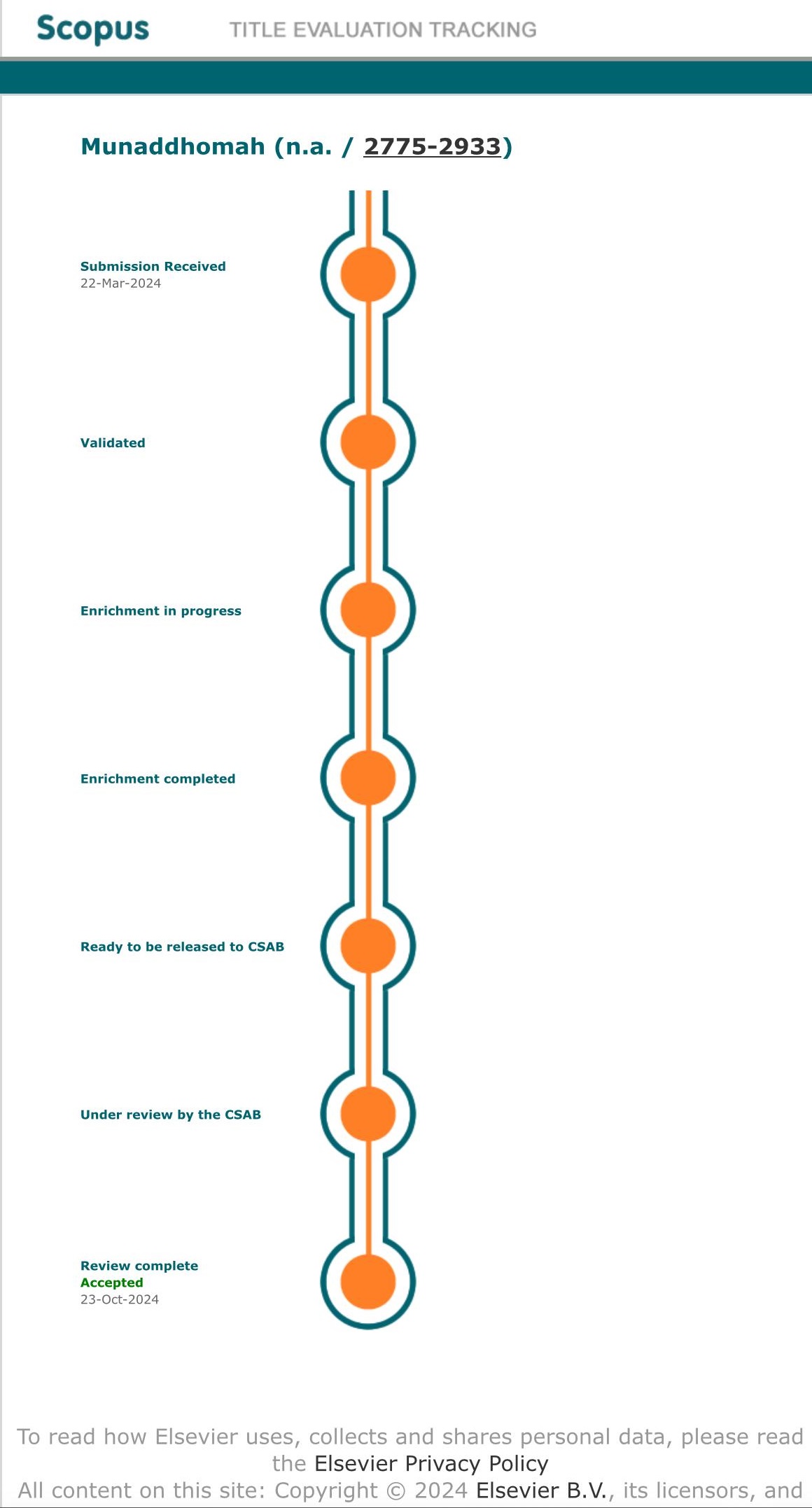Scout Extracurricular Curriculum Management in Improving Student Discipline in Madrasah
DOI:
https://doi.org/10.31538/munaddhomah.v5i2.810Keywords:
Curriculum Management, Scouting, Discipline, Islamic SchoolAbstract
The phenomenon of a learning crisis occurred after the COVID-19 pandemic; discipline is one aspect that must be the main focus of schools during this learning crisis. At MTs Arifah, discipline is the primary goal of extracurricular scouting. This study aims to reveal curriculum management in improving student discipline in the scout extracurricular activities. This research also uses a descriptive qualitative approach to tell the facts of curriculum management of the scout extracurricular to improve student discipline. The results obtained from this study reveal that the management of scout extracurricular curriculum planning begins with preparing Prota and Promes as a reference for activities for one year and evaluations carried out by implicit means, namely oral reports by scout coaches to the principal; this evaluation is more effective because the principal is faster and understands the conditions of extracurricular scouting.
Downloads
References
Ahmad, C. N. C., Yahaya, A., Yahaya, R., Taha, H., & Ibrahim, M. M. (2022). Establishment of Green Chemistry Awareness Instrument for secondary school students. International Journal of Evaluation and Research in Education (IJERE), 11(4), 1833–1844. https://doi.org/10.11591/ijere.v11i4.23406
Ahmad, K., & Ogunsola, O. K. (2011). An empirical assessment of Islamic leadership principles. International Journal of Commerce and Management, 21(3), 291–318. https://doi.org/10.1108/10569211111165325
Al-Shanawani, H. M. (2019). Evaluation of Self-Learning Curriculum for Kindergarten Using Stufflebeam’s CIPP Model. SAGE Open, 9(1), 2158244018822380. https://doi.org/10.1177/2158244018822380
Anderson, K. L., Nesbitt, K. T., Sheeks, N. A., Vrabec, A., Boris, K., & Fuhs, M. W. (2022). Executive function mediates the relationship between Conscious Discipline fidelity and kindergarten readiness. Journal of Applied Developmental Psychology, 79, 101393. https://doi.org/10.1016/j.appdev.2022.101393
Ardiansyah, A. (2020). Manajemen ekstrakurikuler Pramuka dalam meningkatkan prestasi non akademik peserta didik di MTsN Kota Batu (PhD Thesis, Universitas Islam Negeri Maulana Malik Ibrahim). Universitas Islam Negeri Maulana Malik Ibrahim. Retrieved from http://etheses.uin-malang.ac.id/id/eprint/25326
Ariani, D. A. D. (2015). Manajemen Ekstrakurikuler Pramuka. Manajer Pendidikan: Jurnal Ilmiah Manajemen Pendidikan Program Pascasarjana, 9(1). Retrieved from https://ejournal.unib.ac.id/manajerpendidikan/article/view/1099/910
Cook, W. (2021). Does funding targeted at improving the management of schools increase school performance over the long term? Economics Letters, 204, 109871. https://doi.org/10.1016/j.econlet.2021.109871
Hamalik, O. (2003). Perencanaan pengajaran berdasarkan pendekatan sistem. Bumi Aksara.
Hamalik, O. (2008). Kurikulum dan pembelajaran.
Handayani, M. S., Wangid, M. N., & Julius, A. (2021). The Impact of Self-Management Techniques to Improve University Students’ Social Cognition. Islamic Guidance and Counseling Journal, 4(1), 116–123. https://doi.org/10.25217/igcj.v4i1.1247
Hsiao, H.-C. (2021). Effects of Defense Suppliers’ Practice of Online Character Education on the Employees’ Learning Motivation and Perception of Integrity During COVID-19. Frontiers in Psychology, 12, 771124. https://doi.org/10.3389/fpsyg.2021.771124
Kompri, M. P. (2015). Komponen-Komponen Elementer Kemajuan Sekolah. Jakarta: Ar-Ruz Media.
Lafrarchi, N. (2020). Assessing Islamic Religious Education Curriculum in Flemish Public Secondary Schools. Religions, 11(3), 1–29. https://doi.org/10.3390/rel11030110
Lee, C.-Y., Pan, P. J. D., Liao, C.-J., Chen, H.-Y., & Walters, B. G. (2013). E-character education among digital natives: Focusing on character exemplars. Computers & Education, 67, 58–68. https://doi.org/10.1016/j.compedu.2013.02.020
Lewis, K. L., Umstead, K. L., Johnston, J. J., Miller, I. M., Thompson, L. J., Fishler, K. P., … Biesecker, B. B. (2018). Outcomes of Counseling after Education about Carrier Results: A Randomized Controlled Trial. The American Journal of Human Genetics, 102(4), 540–546. https://doi.org/10.1016/j.ajhg.2018.02.009
Lickona, T. (2009). Educating for Character: How Our Schools Can Teach Respect and Responsibility. Random House Publishing Group.
Majid, R. A. (2021). Pembentukan Karakter Religius Peserta Didik Melalui Kegiatan Ekstrakurikuler Pramuka Di MAN 1 BONE. Universitas Islam Alauddin Makassar.
Marbun, P. (2021). Disain Pembelajaran Online Pada Era Dan Pasca Covid-19. CSRID (Computer Science Research and Its Development Journal), 12(2), 129. https://doi.org/10.22303/csrid.12.2.2020.129-142
Mulyasa, E. (2002). Manajemen berbasis sekolah: Konsep, strategi, dan implementasi. Remaja Rosdakarya.
Mustari, M., & Rahman, M. T. (2014). Manajemen pendidikan. RajaGrafika Persada. Retrieved from https://etheses.uinsgd.ac.id/15943/
Nafrin, I. A., & Hudaidah, H. (2021). Perkembangan Pendidikan Indonesia di Masa Pandemi Covid-19. Edukatif : Jurnal Ilmu Pendidikan, 3(2), 456–462. https://doi.org/10.31004/edukatif.v3i2.324
Nasbi, I. (2017). MANAJEMEN KURIKULUM: Sebuah Kajian Teoritis. Idaarah: Jurnal Manajemen Pendidikan, 1(2). https://doi.org/10.24252/idaarah.v1i2.4274
Nasional, K. (2007). Petunjuk Penyelenggaraan Gugusdepan Gerakan Pramuka. Jakarta: Pustaka Tunas Media.
Nasution, S. (2003). Metode Penelitian Naturalistik Kualitatif (Bandung). Tarsito. Library. Fis. Uny. Ac. Id/Opac/Index. Php.
Nieuważny, J., Nowakowski, K., Ptaszyński, M., Masui, F., Rzepka, R., & Araki, K. (2021). Does change in ethical education influence core moral values? Towards history- and culture-aware morality model with application in automatic moral reasoning. Cognitive Systems Research, 66, 89–99. https://doi.org/10.1016/j.cogsys.2020.10.011
Nurdin, N., Jahada, J., & Anhusadar, L. (2021). Membentuk Karakter melalui Kegiatan Ekstrakurikuler Pramuka pada Anak Usia 6-8 Tahun. Jurnal Obsesi: Jurnal Pendidikan Anak Usia Dini, 6(2), 952–959.
Pereira, D., Flores, M. A., & Niklasson, L. (2016). Assessment revisited: A review of research in Assessment and Evaluation in Higher Education. Assessment & Evaluation in Higher Education, 41(7), 1008–1032. https://doi.org/10.1080/02602938.2015.1055233
Pramuka, K. N. G. (2010). Bahan Serahan Kursus Pembina Pramuka Mahir Tingkat Dasar (KMD). Jakarta: Kwatir Nasional.
Rusman, R., & Pd, M. (2009). Manajemen kurikulum. Jakarta: Rajawali Pers.
Suciningsih, E. (2021). Manajemen Ekstrakurikuler Pramuka Dan Pencak Silat Dalam Mengembangkan Nilai Nila I Karakter Mandiri Peserta Didik Pada Madrasah Tsanawiyah Negeri 3 Pati Tahun Pelajaran 2020/2021 (Phd Thesis, UNISNU Jepara). UNISNU Jepara. Retrieved from https://eprints.unisnu.ac.id/id/eprint/1534/
Susanti, S., & Rokhman, M. (2022). Fostering Learners’ Interpersonal Intelligence through Religious Extracurricular Activities: A Case Study in An Islamic School. Tafkir: Interdisciplinary Journal of Islamic Education, 3(1), 92–104. https://doi.org/10.31538/tijie.v3i1.115
Suyadi, D. (2014). Implementasi dan inovasi kurikulum PAUD 2013. PT Remaja Rosdakarya.
Thompson, K. (1992). Quality control in higher education. British Journal of Educational Studies, 40(1), 51–56. https://doi.org/10.1080/00071005.1992.9973910
Wahyudin, D. (2014). Manajemen kurikulum. Bandung: Remaja Rosdakarya.
Wu, H., & Shen, J. (2022). The association between principal leadership and student achievement: A multivariate meta-meta-analysis. Educational Research Review, 35, 100423. https://doi.org/10.1016/j.edurev.2021.100423
Downloads
Published
How to Cite
Issue
Section
License
Copyright (c) 2024 Nurcholis Panji Bayu Astra, Erwin Hafid, Alwan Suban

This work is licensed under a Creative Commons Attribution-ShareAlike 4.0 International License.
Munaddhomah: Jurnal Manajemen Pendidikan Islam is licensed under a Creative Commons Attribution-ShareAlike 4.0 International License.
Based on a work at https://pasca.jurnalikhac.ac.id/index.php/munaddhomah

















